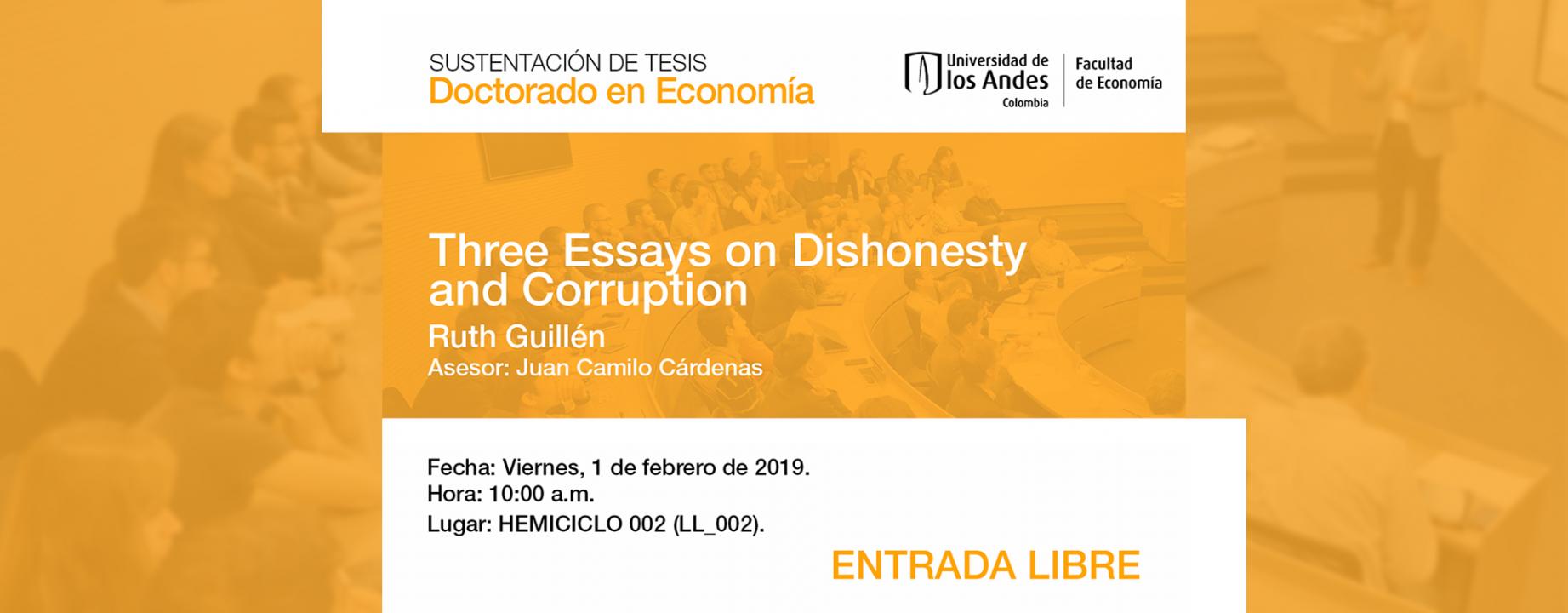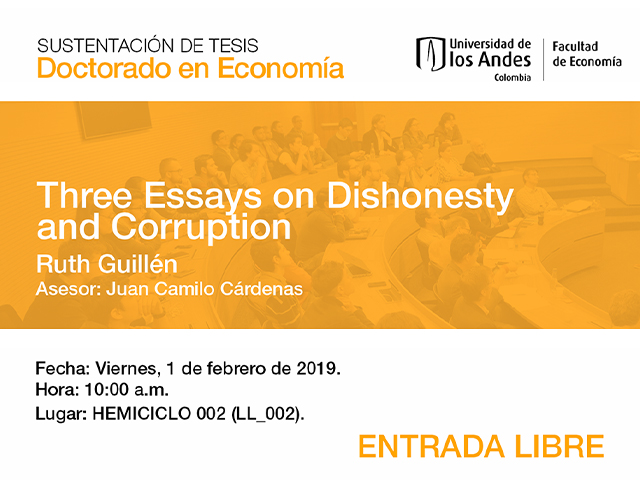Sustentación tesis doctorado en economía

Paper 1. Are Entrepreneurs Ethically Different from Others?
How Career Preferences Can Predict Dishonesty
Ruth Guillén and Juan Camilo Cárdenas
In this paper, we study whether individuals who are interested in initiating a business, are ethically different from others who prefer a career related to a less risky work environment, and traditionally perceived as less exposed to corruption. Using data from the Encuesta de Cultura Académica, 2013, we evaluated how different is the level of acceptance of the breaking of rules—both in the civil and academic contexts—among undergraduate students who preferred an entrepreneurial career instead of performing other occupations, such as, research tasks in academia. Also, we evaluated the seriousness that they associated with different kind of transgressions. An assumption of this study is that people who justify more breaking rules or associate less severity to transgressions could be more likely to commit unethical acts. Our results suggest that people who prefer an entrepreneurship career tend to justify the academy fraud more than subjects with other careers preferences. However, when we analyze the acceptance of breaking the law in the civil context, our findings seem to suggest that future entrepreneurs justify the breaking of the law more than others only in the circumstances related to material values, low probability of detection or when it is perceived as an adequate strategy to obtain good results. The differentiation in the acceptance of dishonest acts among these two groups of subjects was not related to their field of study. Additionally, in regards to the seriousness that subjects associated with specific types of transgressions, we found that future entrepreneurs associated less gravity to different forms of academic fraud, and in the civil context to some unethical acts, such as, to the offering of bribes.
Paper 2. Can Abundance Make us Less Honest? A Bribery Game
Ruth Guillén
In this paper, I study from an experimental perspective whether a sudden increase of State resources increases the likelihood of economic agents to behave corruptly. I developed a theoretical framework in which emotional components such as guilt or pride are considered as variables that contribute to explaining the behavior of the subjects regarding unethical acts. Also, I designed an economic game of bribery to study the corrupt behavior of individuals under scenarios of scarcity and abundance. Corruption is quantified through the offering or the acceptance of a bribe to obtain private benefits. Results suggest that a sudden increase in the availability of public resources increases the likelihood of an individual to offer a bribe. This increase occurs even though, in the context of the game, the monetary benefit associated with the accepted of a bribe is the same in contexts of scarcity or abundance. However, the damage that corruption produces on other private agents can be perceived as lower in abundance settings. Regarding the acceptance of bribes, the data does not reveal a link between an increase in resources and an increase in the probability of accepting bribes. A possible mechanism for explaining the rise of offering bribes in a context of abundance is the subjects’ perception of decreasing costs of externalities and the consequent reduction of the guilt associated with the offering of bribes.
Paper 3. Governance in a Context of Weak Accountability:
Citizens’ Contributions and Misappropriation of Public Funds
Ruth Guillén
In this paper, I study, through a laboratory experiment, how voluntary contributions to finance the production of a good that is provided by a central authority (government) evolve in a context of weak accountability. Also, I evaluate the effectiveness of three institutions, based on communication, rather than pecuniary punishments to induce authorities to behave properly when managing resources, and how such strategic behavior can affect others contributions. In the baseline setting, people decide simultaneously the amount of their endowment they want to place in a public fund that doubles in value before it is distributed among all players. Then, a randomly selected player decides how to distribute the social surplus generated from the voluntary provision, including the possibility of capturing part of the rents; the allocator does not face a formal punishment for his decisions. I test the following signaling among group members against a baseline scenario: i) sending a non-binding message, ii) sending a binding message, and iii) sending a message of satisfaction. Both students and actual public officers participated in this study. Results show that contributions in a context of weak accountability do not decrease significantly over time under the baseline scenario. Also, I find that sending a message of satisfaction from contributors to allocators might be an effective policy to promote cooperation from those who contribute to the production of the good. Furthermore, sending a binding message from allocators to beneficiaries constrained their opportunistic behaviors regarding the appropriation of public resources when participants were students, but in the case of officers, this effect was only observed temporarily. Finally, I do not find effects linked to sending a non-binding message.

